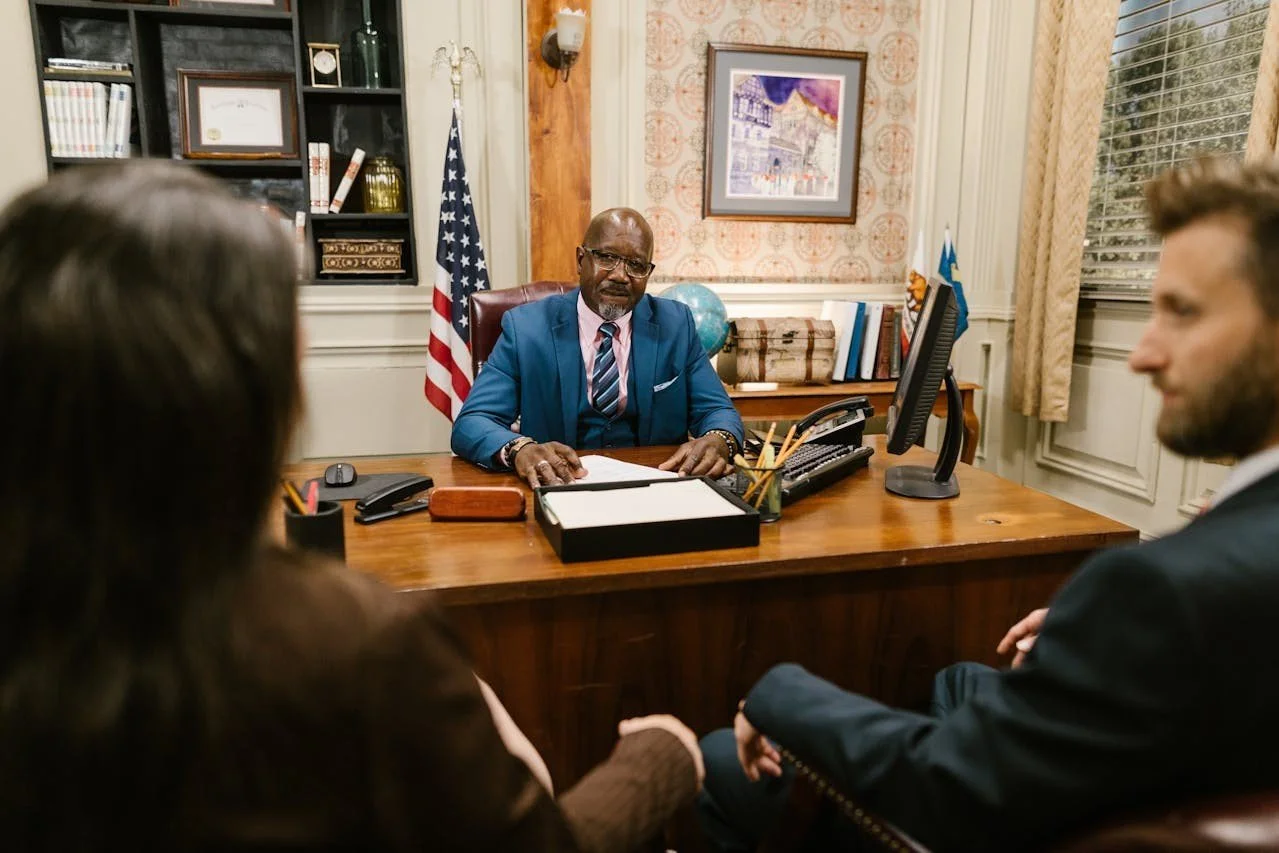The Client Confidence Connection: Why Your Best Relationships Are Your Greatest Professional Asset
It's a paradox in the legal profession: the lawyers who often struggle with confidence aren't the inexperienced ones. They're the accomplished professionals who have built successful practices, yet still question their abilities daily. These attorneys have mastered legal precedents and courtroom procedures, but they haven't unlocked the most powerful confidence-building tool available to them—their client relationships.
Professional confidence isn't just about winning cases or accumulating accolades; it's also about maintaining a sense of self-assurance. It's about the meaningful connections you build with the people you serve. When you understand how to transform client relationships into confidence catalysts, you establish a solid foundation for your legal practice.
This newsletter serves as a guide to understanding why your best client relationships are your most valuable professional asset. It offers actionable strategies for cultivating the kind of connections that naturally foster authentic confidence.
The Foundation: Building Trust That Builds You
When I first started practicing law, I thought confidence came from winning cases and impressing judges—until I realized that my strongest moments of professional certainty came from the quiet conversations in my office where I genuinely helped someone understand their situation and feel heard.
First Impressions Create Lasting Confidence
Every initial client meeting presents an opportunity to reinforce your professional competence, not just to your client, but to yourself. When you walk into a consultation thoroughly prepared, you demonstrate mastery that builds internal confidence alongside external credibility.
Meeting preparation serves as more than client service; it becomes a confidence ritual. The attorney who reviews case files, researches relevant precedents, and anticipates client questions enters each interaction with evidence of their thoroughness. This preparation creates a positive feedback loop, where competent preparation leads to confident presentation, which in turn generates successful client interactions.
Clear communication during initial meetings proves your legal knowledge to the most important audience—yourself. When you can translate complex legal concepts into understandable terms, you validate your understanding. Clients who leave your office with a clear comprehension of their situation provide immediate confirmation of your communication skills and legal knowledge.
Demonstrating empathy grounds your professional identity in genuine care for client outcomes. Attorneys who connect authentically with client concerns discover that this emotional connection strengthens their sense of purpose. When you truly understand what your client faces, you remember why you became a lawyer in the first place.
Ongoing Relationships Reinforce Professional Worth
Regular client updates create consistent opportunities to demonstrate your active case management. Each status call or email that proactively informs clients about case progress reinforces your diligence and commitment. These communications serve dual purposes: they keep clients informed and remind you of your ongoing professional contributions to their cases.
Managing client expectations establishes your role as a trusted advisor rather than merely a service provider. When you help clients understand realistic timelines, potential challenges, and likely outcomes, you position yourself as the knowledgeable professional who guides them through complex legal processes. This advisory role naturally builds confidence in your judgment and professional value.
Demonstrating consistent value through problem-solving reinforces your professional capabilities. Every challenge you successfully address for a client becomes evidence of your competence. When clients recognize your contributions to their success, their appreciation validates your professional worth and strengthens your confidence in your abilities.
Long-term Maintenance Creates Professional Legacy
Relationships that deepen over time create professional bonds that extend beyond individual cases. Clients who return for additional legal needs or refer family members and colleagues provide powerful validation of your professional value. These long-term relationships demonstrate that your service quality creates a lasting impact.
Service excellence maintained consistently over months and years builds cumulative confidence in your professional capabilities. Each successfully completed matter adds to your internal evidence of competence. When you maintain high standards across all client interactions, you create a pattern of success that reinforces your professional identity.
Loyalty is built through authentic care, creating a foundation of professional support. Clients who remain loyal to your practice provide ongoing validation of your service quality and professional character. This loyalty serves as external confirmation that your professional approach creates genuine value for those you serve.
Difficult Situations as Confidence Crucibles
Here's what surprised me most during my decades of practice: the client conversations I dreaded most—the ones involving bad news, setbacks, or complex challenges—often became the moments that taught me the most about my professional strength and resilience.
Conflict Resolution Builds Character
Early issue identification demonstrates your professional alertness and problem-solving abilities. When you recognize potential challenges before they become significant problems, you validate your experience and professional judgment. This proactive approach builds confidence in your ability to protect client interests effectively.
Solution development for complex client challenges proves your analytical capabilities and creative thinking. Each successful resolution adds to your professional toolkit and builds confidence in your ability to handle future difficulties. Clients who see you successfully address their concerns provide immediate validation of your problem-solving skills.
Strategic communication during difficult situations reinforces your professional composure and leadership abilities. When you can maintain clear, helpful communication during challenging circumstances, you demonstrate the kind of professional stability that builds both client trust and personal confidence.
Expectation Management as Professional Authority
Reality alignment without discouraging clients requires the delicate balance that experienced attorneys develop over time. When you can honestly discuss challenges while maintaining client confidence in positive outcomes, you demonstrate the mature professional judgment that comes with experience and expertise. This balance builds your confidence in your advisory abilities.
An option presentation that provides clients with meaningful choices establishes your role as a thoughtful counselor rather than someone who simply executes instructions. When clients make informed decisions based on your guidance, they validate your ability to analyze situations and present viable alternatives.
Collaborative decision-making with clients reinforces your professional partnership rather than a simple service provider relationship. Clients who actively participate in strategy discussions based on your professional guidance demonstrate trust in your judgment and analytical abilities.
Communication Excellence as Confidence Building
One of my early mentors, Dick Lerch, had this remarkable ability to explain the most complex legal concepts in ways that made clients feel both informed and at ease—and watching him taught me that truly effective communication isn't just about client service, it's about proving to yourself that you understand what you're talking about.
Precise Message Delivery Reflects Professional Mastery
Effective content organization in client communications demonstrates your ability to think clearly under pressure and present information in a logical manner. When you can structure complex legal information in ways that clients understand, you prove your own comprehension and communication skills simultaneously.
Using an appropriate tone that matches the client's needs while maintaining professional authority demonstrates your emotional intelligence and professional maturity. Clients who respond positively to your communication style validate your ability to connect authentically while maintaining appropriate professional boundaries.
Understanding confirmation through client feedback ensures that your communication achieves its intended purpose. When clients can accurately repeat back the information you've shared or ask thoughtful follow-up questions, they provide immediate evidence of your communication effectiveness.
Regular Updates Build Professional Reliability
Status reporting that keeps clients informed without overwhelming them demonstrates your ability to strike a balance between transparency and professional judgment. Clients who express appreciation for your communication frequency and quality validate your professional consideration and organizational skills.
Progress communication that highlights achievements while acknowledging remaining challenges shows your honesty and professional perspective. When clients recognize your balanced approach to case updates, they confirm your professional integrity and realistic assessment abilities.
Challenge notification that prepares clients for difficulties while maintaining confidence in favorable resolution demonstrates professional maturity and emotional intelligence. Clients who remain confident in your abilities despite honest discussions of challenges validate your professional communication skills.
Documentation as Professional Insurance
Creating a meeting summary that captures important decisions and next steps demonstrates your professional thoroughness and organizational abilities. Clients who reference your detailed summaries in future conversations demonstrate your professional attention to detail.
A decision recording that creates clear accountability for both the attorney and the client establishes professional transparency and mutual responsibility. When clients appreciate this clear documentation, they validate your professional approach to relationship management.
Follow-up tracking that ensures commitments are met on both sides demonstrates your professional reliability and organizational systems. Clients who consistently experience this level of professional follow-through develop trust in your capabilities and professional character.
Long-Term Relationship Maintenance as Career Confidence
After forty years in practice, I can tell you that some of my most significant sources of professional pride aren't the big verdicts or courtroom victories—they're the Christmas cards from clients I helped decades ago, the referrals from families who trusted me with their most critical legal matters, and the knowledge that I've built something lasting and meaningful.
Service Excellence as Self-Respect
Maintaining consistent quality across all client interactions establishes a professional standard that fosters cumulative confidence over time. When every client receives the same level of careful attention and professional service, you demonstrate your professional character and capabilities.
Professional standards that never compromise on quality, regardless of case size or client prominence, demonstrate your professional integrity and self-respect. Clients who recognize this consistent approach validate your professional values and character.
Work satisfaction that comes from maintaining high standards creates positive associations with your professional identity. When you can genuinely take pride in the quality of your work, you build authentic confidence in your professional capabilities and character.
Referral Cultivation as Reputation Validation
Client referrals represent the ultimate external validation of professional competence and character. When satisfied clients recommend your services to people they care about, they provide robust evidence of your professional value and trustworthiness.
Word-of-mouth reputation that generates new business opportunities validates your professional approach and service quality. Potential clients who seek your services based on referrals confirm that your professional reputation accurately reflects your capabilities.
Professional network expansion through satisfied client connections creates ongoing opportunities to demonstrate your capabilities to new audiences. Each successful referral relationship enhances your professional credibility and fosters confidence in your ability to effectively serve diverse client needs.
The Compound Effect of Confident Client Relationships
Looking back over my career, I'm struck by how the attorneys who seem most genuinely confident and fulfilled aren't necessarily the ones with the highest-profile cases or the most significant settlements—they're the ones who have learned to find deep satisfaction and professional validation in the daily work of serving their clients well.
Professional Capital Building
Every positive client interaction contributes to your professional confidence account, accumulating evidence of your competence and character. Over time, these interactions establish a solid foundation of professional self-assurance based on objective evidence rather than wishful thinking.
Sustainable confidence growth through authentic client relationships fosters lasting professional strength that is not dependent on external validation or recent successes. This internal confidence provides stability during challenging periods and enhances performance during successful times.
Professional freedom emerges when you no longer question your fundamental capabilities or worth as an attorney. Lawyers who build confidence through strong client relationships report greater satisfaction, reduced anxiety, and increased willingness to take on challenging cases.
Authentic Confidence Advantage
Genuine professional self-assurance based on evidence of successful client relationships provides more reliable confidence than techniques or positive thinking alone. When your confidence rests on a foundation of meaningful professional connections, it withstands challenges and setbacks more effectively.
Professional identity alignment occurs when your daily work reflects your values and demonstrates your capabilities to yourself and others. Attorneys who build confidence through client relationships often report feeling more authentic and purposeful in their professional lives.
Career satisfaction enhancement results from the positive feedback loop between strong client relationships and professional confidence. When your work consistently generates positive interactions and has a meaningful impact, you develop a deep sense of satisfaction with your professional choices and capabilities.
Your Client Relationships: The Foundation of Lasting Professional Confidence
When I reflect on what has truly sustained me through four decades of legal practice—through the challenging cases, the unexpected setbacks, and even those moments when I questioned whether I belonged in this profession—it wasn't the academic honors or the impressive verdicts that gave me strength. It was the knowledge that I had genuinely helped people, that my clients trusted me with their most important concerns, and that I had built something meaningful through authentic professional relationships.
This realization transformed not just how I practiced law, but how I understood what it means to be genuinely confident as an attorney. Real professional confidence isn't about never feeling uncertain—it's about knowing that you have the skills, character, and genuine care for others that enable you to serve your clients well, regardless of what challenges arise.
The Choice Before You
Every client interaction you have tomorrow presents a choice. You can approach it as just another task to complete, another item to check off your list, or you can see it as an opportunity to strengthen both your client's situation and your professional foundation. When you genuinely invest in your client relationships—when you listen carefully, communicate clearly, and genuinely care about outcomes—you're not just building a successful practice. You're building unshakeable professional confidence that no courtroom loss or difficult opposing counsel can undermine.
The attorneys I've coached who make this shift consistently report something remarkable: they stop feeling like they're performing the role of a confident lawyer and start being one. Their clients sense this authenticity, their colleagues respect this genuine confidence, and most importantly, they begin to enjoy practicing law again, truly.
Your Professional Legacy
Your client relationships represent more than business transactions or professional obligations. They are the living proof of your professional worth, the daily evidence of your competence, and the foundation of whatever legacy you'll leave in this profession. When you understand that your best relationships are indeed your greatest professional asset, you discover something powerful: you already have everything you need to build authentic, lasting confidence.
The question isn't whether you're capable of developing this kind of relationship-based confidence—you are. The question is whether you're ready to invest in the one professional development strategy that will serve you for the rest of your career. Your clients are waiting, your practice is ready, and your most confident professional self is just one authentic conversation away.
The client confidence connection isn't just a strategy—it's a transformation. And it starts with your very next client interaction.





